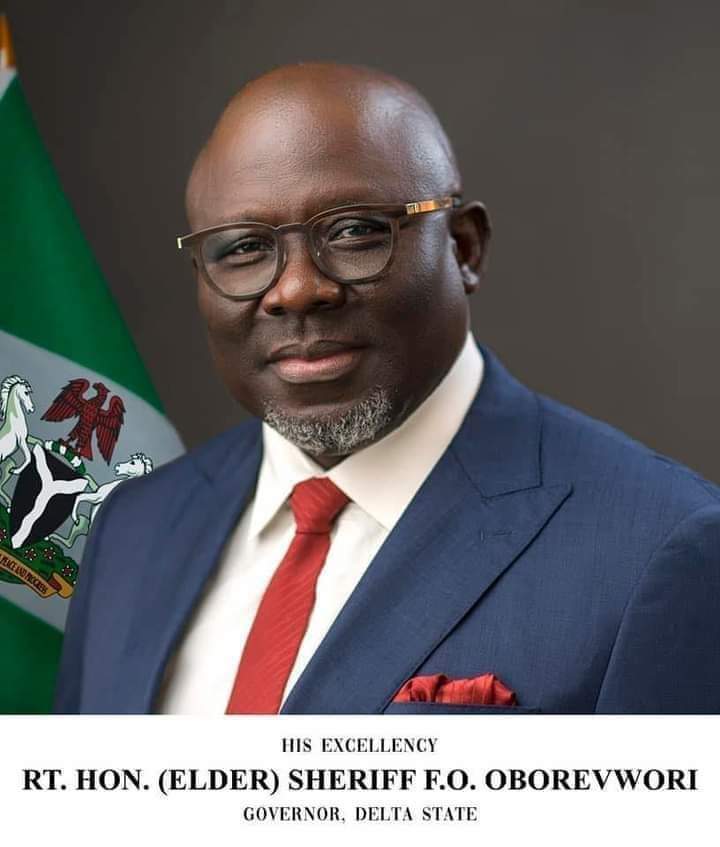The Director General of the Delta State Orientation and Communications Bureau, Dr. Fred Latimore Oghenesivbe, has reaffirmed his conviction that Governor Sheriff Oborevwori will continue to lead Delta State until May 29, 2031.
According to Oghenesivbe, the governor’s visionary leadership and commitment to good governance are already yielding significant infrastructural and socioeconomic benefits across the state’s three senatorial districts.
Speaking in Lagos after defending his postgraduate dissertation, titled “Assessing the Public Relations Credentials and Performance of Presidential Spokespersons in Nigeria’s Fourth Republic“, at the University of Lagos, Oghenesivbe noted that Governor Oborevwori’s MORE Agenda is laying the groundwork for lasting reforms and rapid development.
He added that the administration’s prudent financial management had saved the state over N200 billion, and the governor’s proposed N936 billion budget for 2025 would further drive the state’s economic and infrastructural transformation.
Oghenesivbe emphasized that the Oborevwori administration’s approach to blocking financial leaks and cutting frivolous expenditures will be sustained. He predicted that, with the governor’s policies, Delta State will experience accelerated growth in wealth creation and job opportunities, transforming the state into a construction hub.

Commenting on the ongoing internal crisis within the People’s Democratic Party (PDP) at the national level, the communications strategist expressed confidence that the party will overcome its challenges. He urged PDP governors and party elders to unite against forces seeking to weaken the party ahead of the 2027 elections. He also highlighted the comparative prosperity enjoyed under the PDP’s 16-year rule, in contrast to the economic hardships currently associated with the ruling All Progressives Congress (APC).
Dissertation Insights on Presidential Spokespersons
In his academic dissertation, Oghenesivbe examined the public relations credentials and performances of key presidential spokespersons in Nigeria’s Fourth Republic, including Dr. Doyin Okupe, Uba Sani, the late Oluremi Oyo, Segun Adeniyi, Ima Niboro, Dr. Reuben Abati, Femi Adesina, and Ajuri Ngelale. The study analyzed their academic qualifications, prior professional experiences, and the public relations models they employed in communicating government activities.
Supervised by Dr. Unwana Samuel Akpan of the University of Lagos, the research revealed that most presidential spokespersons lacked formal public relations qualifications, with the late Oluremi Oyo being the only one with a background in mass communication.
According to the findings, Dr. Abati and Adesina relied heavily on media-focused strategies consistent with the Press Agentry/Publicity model, while Oyo, Adeniyi, and Niboro preferred the Public Information model.
Dr. Okupe’s communication strategy was rooted in traditional media with limited interactive elements, while Ngelale and Sani were rated poorly in overall performance. The study concluded that while Nigeria’s presidential spokespersons from 1999 to 2024 effectively managed communication strategies and the government’s public image, their lack of formal PR training and certification limited their success in fostering public engagement and transparency.
Recommendations for Improved Strategic Communication
The study recommended that future presidential spokespersons should acquire formal public relations training and certification from the Nigerian Institute of Public Relations (NIPR) to enhance their professional capacity. It also advocated for a balanced integration of traditional and digital media, ensuring real-time social media engagement while maintaining control over messaging through conventional platforms like TV, radio, and newspapers.
Furthermore, the study encouraged the adoption of more interactive communication models, such as the Two-Way Asymmetrical and Two-Way Symmetrical models, to foster greater public trust and transparency. It emphasized the need for proactive public engagement to address public concerns and strengthen the government’s messaging.
Oghenesivbe concluded by stating that his study contributes to the evolving body of knowledge on political communication and media strategies in governance, while also reinforcing the importance of ethical practices and formal training in public relations, as advocated by the NIPR.
0





